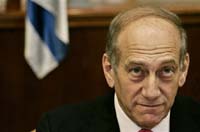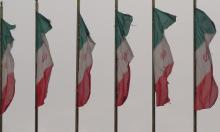Olmert’s first visit to Washington: much expression
Deflated Israeli expectations but much expression of U.S. goodwill are expected to be the hallmarks of Ehud Olmert's first visit to Washington this week as Israel's prime minister. Olmert, who is to meet with Secretary of State Condoleezza Rice on Monday and with President George W. Bush the following day, had sought endorsement of his ambitious plan to draw Israel's final borders with the Palestinians within two years by pulling tens of thousands of Israeli settlers out of large chunks of the West Bank.

But Bush, who has never made Israeli-Palestinian peacemaking a pillar of his foreign policy, has been cool to the idea. Bush is occupied with Iraq and maintaining international pressure on Iran to abandon its nuclear program. He may be loath to take on European and Arab allies who oppose Olmert's plan to unilaterally set borders if the Palestinians' Hamas rulers don't change their violently anit-Israel ways. Unilateral Israeli action is also anathema to moderate Palestinian President Mahmoud Abbas.
What the U.S. is expected to do is to receive Olmert warmly, but press him to at least go through the motions of trying to negotiate a final deal not with Hamas, but with Abbas, whose Fatah party was swept from power in January parliamentary elections. Olmert has been reluctant to do so, reasoning that no distinction should be made between the Hamas government, which has refused to renounce the movement's call for Israel's destruction, and the Palestinian president, who was elected separately last year.
He's also skeptical of Abbas' ability to deliver at a time when confrontations between his loyalists and Hamas gunmen have turned increasingly bloody, including assassination attempts against two of his top security chiefs in recent days. "Abbas doesn't have even the power to take charge of his own government," Olmert told CNN on Sunday, ahead of his visit to Washington. "So how can he represent that government in the most crucial, complex and sensitive negotiations, about which there are so many divisions within the Palestinian community?"
On Monday, members of a new Hamas militia and Palestinian police loyal to Abbas traded heavy fire near Gaza City's parliament building, killing the driver of the Jordanian ambassador and wounding at least 11 people. A senior Israeli government official told The Associated Press that Israel would "be willing to go bilateral" if Abbas would start fulfilling pledges he made before the election.
"He said after the election he would dismantle the terrorist organizations," the official said, speaking on condition of anonymity because he is not authorized to speak to the press. Abbas would not have to complete the disarmament before talks could begin, but he must at least start going down that road, the official said.
In a bow to the U.S., Israel held its first high-level talks with Abbas since the Palestinian elections at an international conference in Egypt. At that meeting, Abbas appealed to Israeli Foreign Minister Tzipi Livni to restore regular contacts between the two sides. The official who spoke with The AP said Olmert would meet with the Palestinian president after meeting first with President Hosni Mubarak of Egypt and King Abdullah of Jordan both of whom have cautioned against Israeli attempts to set final borders with the West Bank.
Olmert's objection to talks with Abbas have also put him at odds with people in his own government. Defense Minister Amir Peretz of the dovish Labor Party called earlier this month for immediate negotiations with the Palestinian president. And on Monday, Vice Premier Shimon Peres said Abbas was the only game in town. "There is no one else. It is either Hamas or him. Since Hamas is out of the question, Abu Mazen is the only one that can be considered," Peres said, referring to Abbas by his popular name, reports the AP.
N.U.
Subscribe to Pravda.Ru Telegram channel, Facebook, RSS!





